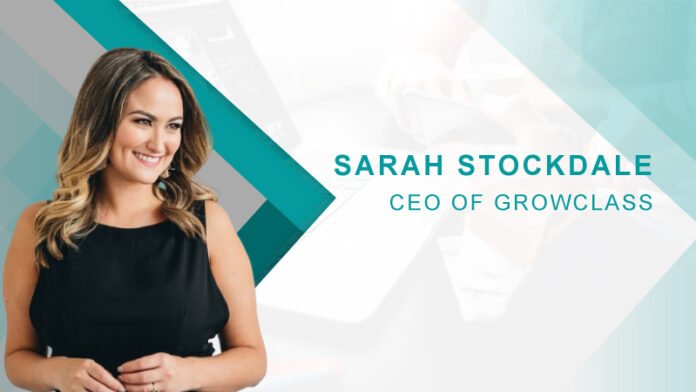Hello Sarah, welcome to HRTech Cube! Could you share your professional journey and what inspired you to launch Growclass?
I ended up in tech a little bit by accident. When I graduated from my masters back in 2011, I had two options— work at a big PR firm, or take a 3-month contract at a tiny accounting software startup. The PR firm was the shinier, safer option, but the startup seemed like the place where I’d learn a whole lot faster. I chose the startup, and then they raised a big round of funding, and I was able to stay on the growth team. From there, I spent the next 10 years building growth teams for both Toronto and San Francisco startups.
I built Growclass for two reasons; first, I couldn’t find great growth marketing talent in Canada. For every team I joined and consulted on, I’d bring on recent grads and train them myself. Second, I couldn’t find a space for women and underrepresented people to learn non-fluffy growth marketing skills. All of the offerings in the market weren’t specific to growth, had a lot of jargon and arrogance, or had really outdated digital marketing content. With years of experience in building growth teams and advising companies, I recognized the challenge in sourcing and training new talent. I wanted to build a place where women and underrepresented people could acquire tangible skills, build a real professional network, and accelerate their careers in a supportive and never-intimidating space.
With inflation and the rising cost of living, how can upskilling help Canadians ask for a raise or secure higher-paying jobs?
When you trust your skills, switching jobs or applying for a promotion feels less like a leap and more like a natural next step. Upskilling allows you to build the skills listed in the job description you want, so when you’re interviewing, you can speak confidently about your skills and have specific portfolio pieces to point to. The evidence speaks for itself: according to Gallup research, after engaging in upskilling, workers can earn up to $8,000 more on average.
As a female entrepreneur, what were some of the key challenges you faced while bootstrapping your company, and how did you overcome them?
Bootstrapping my company has been a trip— one I took through both a global pandemic and a recession. Early days, I had to navigate a system that systemically undervalues women founders, so we figured out how to grow without outside funding. Instead of raising money, we used the consultancy to fund Growclass while we built it so we wouldn’t have to take on outside capital or debt. Since then, we’ve grown by being scrappy with resources and delivering real results for our students. We focus the majority of our time on the experience of Growclass being world-class and different from our competition— so our alumni become advocates (and friends).
What essential skills are companies currently seeking, and what advice would you give to someone just starting their upskilling journey?
We partnered with Angus Reid, a polling provider, this past October to reveal the top skills Canadian workers are looking to upskill over the next 12 months. Surprisingly, the number one skill is communication and interpersonal skills at 60%, followed by leadership and management at 48%, and finally, artificial intelligence at 37%.
When looking at which program is right for you, prioritize upskilling opportunities that go beyond just teaching skills. Look for reviews and, most importantly, a strong community and network—connections often lead to jobs more than skills alone. Talk to graduates to get a real sense of the experience and whether it’s aligned with your career stage and goals. A program that offers both the right content and a supportive network can make all the difference.
How can upskilling help Canadian workers adapt as the needs of companies continue to evolve?
Employers need talent that can jump into a business, understand their tech stack, and immediately start adding value. But most of us came from traditional education, which is struggling to keep up with the pace of technological change. Then, employers don’t have the time or resources to train folks properly so employees often have to learn it on their own while also doing their full-time jobs — which is really hard.
Upskilling means you don’t have to learn it on your own. Good upskilling means you have access to really great, practical training that’s built for folks already working full-time. The kind of training they are actually excited to enroll in. And employers who don’t have the bandwidth to train their new hires should pay for that training.
What role does salary transparency play in creating a fair and equitable workplace, and how can companies implement it effectively?
Salary transparency is one of the most impactful ways to create a fair and equitable workplace. When companies openly share pay ranges, it helps to level the playing field, especially for people from underrepresented groups who often face systemic disadvantages in negotiations. Transparency builds trust. Understanding your compensation is key to feeling like you work in an organization that cares about your career progression. It also ensures fairness and moves compensation decisions away from subjective biases toward clear, role-based benchmarks.
To get it right, start with a pay audit to uncover and address disparities. Then, establish clear salary bands tied to objective criteria like responsibilities, experience, and market rates. Be transparent about how pay is determined and train managers to talk honestly about compensation. Put pay ranges on your job descriptions so anyone joining your team has clear expectations of how to negotiate compensation.
What steps can organizations and communities take to better support female founders and encourage more women to pursue careers in tech?
If we want to see more women founders and women thriving in tech, we need to prioritize getting funding directly into their hands. That means creating grants, investment programs, and funding processes specifically designed to counter the bias in our current systems of (broken) capital allocation. In short: fund women-led businesses.
How can upskilling initiatives be made more accessible to underrepresented groups in the tech industry?
If we want upskilling initiatives to reach underrepresented groups in tech, we need to make them accessible, affordable, and practical. That means scholarships, grants, or employer partnerships that are designed to be flexible. Upskilling should be online or part-time to fit the lives of people juggling work and caregiving. Great programs will come with wrap-around support, like coaching and networking opportunities.
The Digital Marketing Skills Canada program, funded by Upskill Canada and the Government of Canada, is a fantastic example of this done right. Through it, Growclass has trained 500 Canadians on scholarships, making upskilling accessible and valuable.
What personal strategies have helped you navigate the challenges of entrepreneurship and leadership in a fast-changing industry?
Building a company during a pandemic and growing it through a recession taught me that the founders who make it are the ones who, to put it bluntly, have businesses that are hard to kill. Low burn and resourceful, clever teams are key to surviving this era of business building. Personally, I set firm boundaries with my own time to avoid burnout, because building a business isn’t a sprint, it’s a long marathon. I pick my son up from daycare every day at 4:30, and I don’t work on weekends.
What final thoughts would you like to share about the importance of upskilling, salary transparency, and fostering inclusivity in the workplace?
Upskilling isn’t just about acquiring new skills—it’s about creating economic opportunities for underrepresented groups. Salary transparency builds trust and fairness in organizations, and fostering inclusivity isn’t just a moral imperative—it’s a business one. Organizations that prioritize these principles will attract and retain the best talent, creating workplaces that reflect the future we all want to see.

Sarah Stockdale, CEO of Growclass
Sarah Stockdale is the Founder of Growclass, an award-winning Growth Marketing Certification and community of Founders and Marketers. Prior to Growclass, Sarah helped lead growth teams for Tilt (acq by Airbnb) and Wave (acq by H&R Block). Sarah is also the Host of The Growth Effect, a Globe and Mail podcast, and the author of the popular millennial newsletter We Need To Talk About This.












